Changing attitudes toward work help explain the changing demographic profile of the American work force. With a college degree increasingly seen as a necessity for the good life, many young people ages 16 to 24 report they are staying out of the labor force to concentrate full time on their education. At the other end of the work life cycle, older adults are healthier, living longer17 and more inclined than any time in recent decades to work past the traditional retirement age of 65. A majority of those who do so say they keep working mainly for the intangible rather than the economic rewards, according to the Pew Research Center survey.
However, the survey also finds that the recession appears to be accelerating both of these trends. As the sour economy dries up employment prospects, more than four-in-ten nonworking young people say they have tried without success to find a job. At the same time, nearly four-in-ten employed adults ages 62 and older18 say the bad economy has forced them to delay their retirement plans. And a majority of adults between the ages of 50 and 61 think the recession might cause them to do the same.
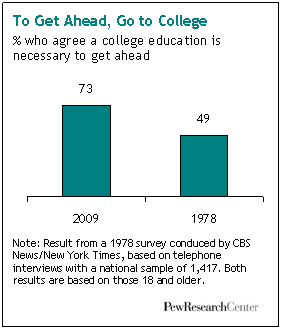
The survey also has some compelling findings about gender, family and work. It finds that nonworking women are nine times as likely as nonworking men to cite child care or family responsibilities as a big reason they don’t have a job.
The differential tug of family responsibility on men and women is underscored when employed parents are asked about the kind of work schedule they would prefer. Fully six-in-ten working women with children ages 16 and younger say they would trade their full-time jobs for part-time employment. But among fathers with younger children, an even larger majority (81%) prefers to keep working full time.
To measure the attitudes behind the changing demographics of the American workplace, a representative national sample of 1,815 adults ages 16 and older was interviewed by telephone July 20 to Aug. 2. For analysis purposes, interviews were conducted with oversamples of young people ages 16 to 24 as well as employed adults aged 65 or older who have not yet retired. The wide-ranging survey also measures what people value most about working, and the reasons people who are not working do not have jobs. Other questions measure how Americans feel about their jobs and work life in general.
Reasons People Work
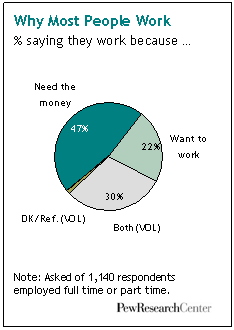
The survey finds that people work for a variety of reasons — some of them economic, some of them social and psychological. Nearly nine-in-ten working Americans say that a big reason they hold a job is to earn a living and provide for their families. About three-quarters report that one of the reasons they are working is to live independently. Nearly two-thirds say that a big reason they work is to build up a retirement nest egg, earn a pension or qualify for Social Security. More than half cite health care benefits as a major reason for working.
But more than pocketbook concerns compel people to work. Nearly seven-in-ten say they work to “feel like a useful person” while nearly half work “to help improve society.” About four-in-ten say they work to “give myself something to do” while slightly fewer say they work to be with other people — a view most frequently expressed by older adults of both genders.
Another survey question that measures the motivation to work in a slightly different way produces a similar result. When employed Americans are asked directly if they work because they need the paycheck or because they want to work, slightly fewer than half say they work only because they need the money (47%). Slightly more than half either report that they want to work (22%) or say both factors are equally important to them (30%).
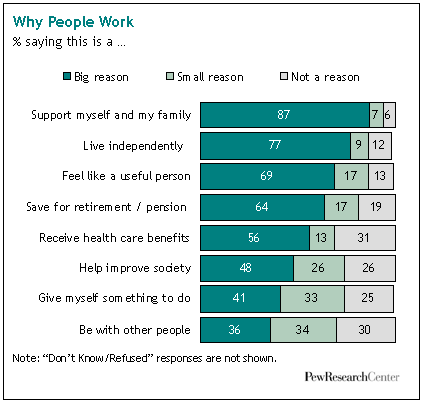
What are Americans looking for in a job? A good paycheck, of course. But money is only one of many factors that people find desirable, and it’s far from the most important. By a considerable margin, survey respondents say they value a job that offers better job security (59%) over a job with a good salary but less stability (33%). And it’s not the recession that has made Americans willing to sacrifice money for security. In 1989 the General Social Survey asked adults how they valued 10 different aspects of a job, including job security, high pay, flexible hours and the opportunity to do interesting work. Job security topped the list back then as well, with 54% saying it was “very important” to them — more than double the proportion who said they most valued a high income (25%).
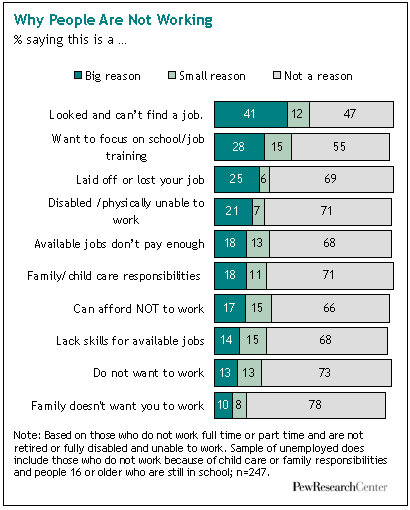
Reasons People Do Not Work
Americans who aren’t employed and have yet to retire have a wide range of reasons for not working.
About four-in-ten say a big reason is that they’ve looked in vain for a job that simply isn’t there. Nearly three-in-ten say they’re not working in order to concentrate on their education or job training.
Smaller proportions say they are disabled (21%) or have child care or other family responsibilities (18%) that keep them out of the labor force. And about one-in-eight (13%) say a big reason they don’t have a job is that they simply don’t want to work.
Job Satisfaction
The survey finds that nine-in-ten employed adults are either “completely satisfied” (30%) or “mostly satisfied” (60%) with their jobs. Older working adults are the most content: 54% say they are completely satisfied with their jobs.
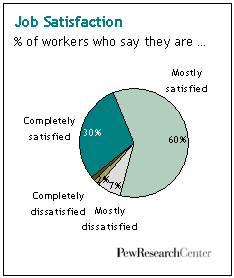
In June 2006, before the onset of the current recession, a virtually identical share of all workers (89%) reported they were satisfied with their job. In fact, overall job satisfaction levels appear to have little relationship to the business cycle; they have been stable since at least 1989, when the Gallup Organization first asked this question and found that 89% of all workers were satisfied with their jobs. It could be that, in bad economic times, the negative impact on workers (in terms of salary freezes, involuntary furloughs and the like) are balanced by a greater appreciation that workers feel simply to still have a job.
The remaining three parts of this section examine how these attitudes toward work interact with recent demographic changes in the workplace — and how the recession may be affecting both. The first part examines the reasons young people are a diminishing presence in the work force and how the increasing value of higher education is influencing decisions to go to work or go to college.
The second part looks at the growing presence of older adults in the work force and explores in more detail the impact of the recession on decisions to retire or continue working. The final part explores how attitudes toward work, family and gender roles affect the working lives of men and women in different ways.
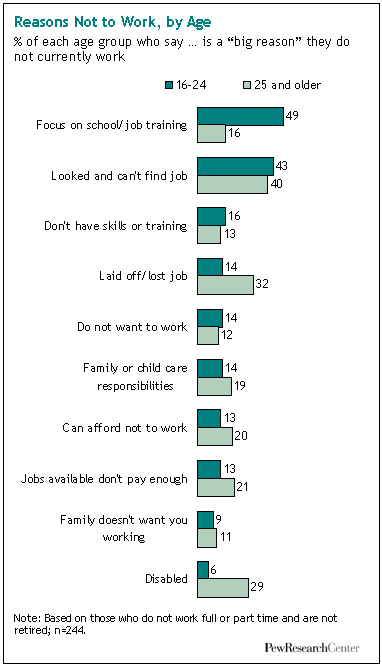
Young People and Work
In 1978, a New York Times survey found that only about half of all adults agreed with the proposition, “In order to get ahead in life these days, it’s necessary to get a college education.” Today, almost three-quarters see the need for a college degree — including 84% of young people between the ages of 16 and 24.
Other survey findings underscore the value that today’s young people place on education — and suggest why they appear to be increasingly inclined to forgo the benefits of working part time or full time in order to concentrate on their studies.
Among young people ages 16 to 24 who do not work, nearly half (49%) say they are not working because they want to “focus on school or job training,” the single biggest reason that young people say they’re not employed.
At the same time, a growing proportion of younger people are entering college directly after high school, a trend that directly reduces the number of adults in the labor force at any one time.
According to the survey, only about two-thirds (65%) of all those age 65 or older who continued their education after high school went directly to college. But among those high school graduates younger than age 30, nearly nine-in-ten (87%) say they went straight to college. Conversely, only about 11% of this younger group took at least a year off to work between high school and college. That’s less than half the proportion of older adults who took a work break before resuming their education.
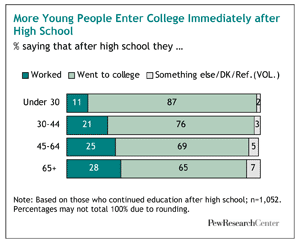
But changing attitudes about the value of a college degree aren’t the only reason fewer young people are in the labor force. The recession appears to have had an impact as well.
When asked the main reasons that they were not working, slightly more than four-in-ten (43%) nonworking young people say they have looked but failed to find a job — virtually identical to the 40% of older unemployed workers who say they have been unsuccessful in their attempts to find employment. An additional 16% say they lack the skills to qualify for available jobs, while 13% say the jobs available to them simply don’t pay enough to lure them away from their books or other interests.
Minorities, Women More Likely to Value a College Degree
The survey finds that women are more likely than men to place a high value on a college education: 78% of women say it is necessary to have one to get ahead in life, compared with 69% of men. Blacks (83%) and Hispanics (85%) also are more likely than whites (69%) to say a college degree is a necessity. And while the sample sizes are too small to say with certainty, black women in particular are more likely than black men to consider a college degree a necessity.
Growing Older, Working Longer
Americans are working to an older age now than they were just a few years ago, a reflection of a long-term trend toward later retirement and the short-term impact of the recession on retirement nest eggs. If anything, the bad economy seems likely to accelerate this trend in the near future: The survey finds that a majority of working adults ages 50 to 61 report they may have to delay their retirement because of the economic downturn.19
Older workers tend to be content workers: They are about twice as likely as their younger and middle-aged colleagues to report being very satisfied with their jobs. The survey points to a clear explanation: For workers ages 65 and older, the decision to stay on the job is more likely to be discretionary and less likely to be motivated by the need for a paycheck. They are comparatively more likely to be attracted to work by intangible benefits, such as a desire to connect with other people and to have something to do.
The Recession and the Decision to Retire
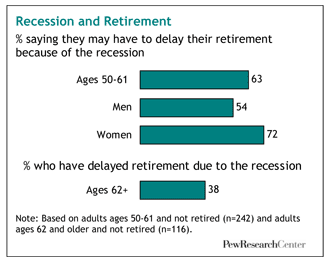
In the past decade, the proportion of older adults in the labor force has been growing steadily. The Pew Research survey suggests the recession may have accelerated this trend. Many older adults, their retirement nest eggs battered by the bad economy, have already opted to hold on to their jobs. And even more on the threshold of retirement are reconsidering plans to stop working.
According to the survey, nearly four-in-ten adults who have reached the median retirement age of 62 but have not yet stopped working say they had to delay their retirement “because of current economic conditions.” Among those nearing retirement age — ages 50 to 61 — a 63% majority think they might have to delay retirement because of the recession.
Women in this retirement “threshold generation” have been most affected by the ailing economy. Fully 72% fear they will have to postpone their retirement plans, compared with 54% of men in this age group. (Among those age 65 and older who have not yet retired, the pattern is the same. Women are more than twice as likely to say they have had to delay retirement plans, though the subsamples of men and women are too small to draw firm conclusions.)
Job Satisfaction Highest among Older Workers
Compared with younger workers, employed adults 65 and older are far more satisfied with their jobs. Fully 54% of working adults 65 and older report they are “completely satisfied” with their current job, nearly double the 29% of workers younger than 65 who are similarly pleased with their job.
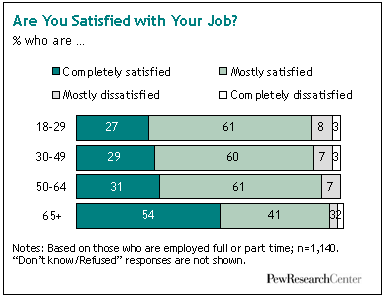
There is another big difference between older workers and their younger colleagues: They are far more likely to hold part-time jobs. Could older workers’ more relaxed work schedules explain why they are so content?
The survey suggests the answer is no. Older adults who work full time are more content than their younger colleagues: 66% say they are completely satisfied with their jobs, compared with 29% of other full-time workers. Among part-time workers, older adults are twice as likely as their younger part-time colleagues to be completely satisfied with their jobs (49% vs. 28%).
The reason for these differences is partially explained by the fact that the overwhelming majority of older workers prefer to be working part time while younger part-time workers disproportionately long for full-time employment.
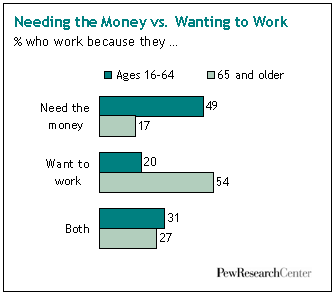
According to the survey, nearly four-in-ten (37%) of all part-time employees younger than 65 would prefer to be working full time, compared with 13% of part-timers 65 and older. (Still, fully 61% of younger people and 87% of older people find part-time work preferable.)
Needing vs. Wanting to Work
Other results underscore the discretionary nature of employment for many adults 65 and older. Older workers are significantly less likely than other employed adults to say a big reason they work is to “support myself and my family” (53% vs. 89%). When set against the seven other reasons tested in the survey, earning a living topped the list among all employed adults but ranked only in the middle of the pack among workers 65 and older.
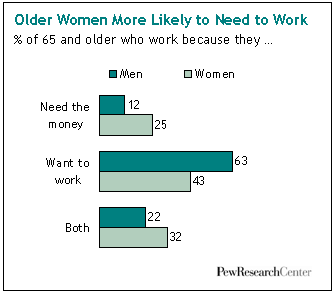
Moreover, older workers are far more likely than their younger colleagues to say they work because they want to, not because they have to. Workers younger than 65 are nearly three times as likely as their older colleagues to say they work because they need the money (49% vs. 17%). Conversely, older workers are more than two and a half times as likely as younger workers to say they are employed because they want to work (54% vs. 20%), while about equal shares of both age groups say both reasons are equally important to them.
Overall, about 12% of older women and 25% of older men do some kind of work for pay. As a group, working older women are significantly more likely than older men to say they are working because they need a paycheck (25% vs. 12%) and significantly less likely to say they are working because they want to (43% vs. 63%).
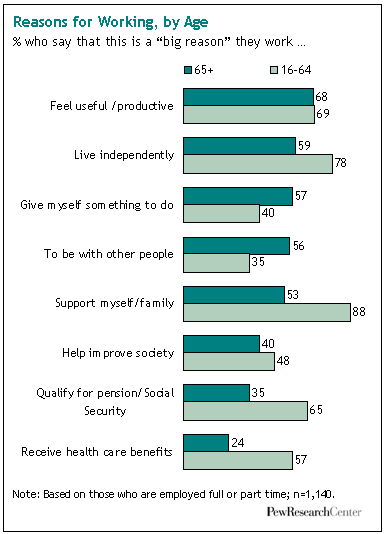
Reasons Older Adults Work
If money doesn’t explain why so many older adults work, what does? Again, the survey results offer a clear answer: For older workers, a job is far more than merely a paycheck.
In fact, older people and younger workers tested significantly differently on seven of the eight reasons for working tested in the survey. The excepti on: Nearly seven-in-ten older workers (68%) say the desire “to feel like a useful and productive person” is a big reason they work. It is the single most frequently mentioned factor among the eight and the only one in which a similar proportion of younger workers (70%) share this view.
Older workers are less likely than those younger than 65 to say that the desire to live independently is a big reason they work (59% vs. 79%). But they are significantly more likely than their younger colleagues to say they work to give themselves “something to do” (57% vs. 41%) and “to be with other people” (56% vs. 35%) — findings that suggest that a job is viewed as a social outlet more by older adults than by younger workers.
Older workers are less likely than their younger colleagues to be working to “help improve society” (40% vs. 49%). Nor are they as likely to say they are working to build up their retirement nest egg or qualify for pensions, reasons that have far less relevance to workers 65 and older who are eligible for Medicare and may already be receiving Social Security and pension checks.
Taken together, the survey results suggest that older people value a job for many reasons, not the least of which are the intangible psychological benefits that flow from working. As the population continues to age — and a growing share of older Americans remain in vigorous good health well past their 65th birthdays — these findings suggest that a job will be an increasingly attractive alternative to full-time retirement for many Americans in their later years.
Having to Retire vs. Wanting to Retire
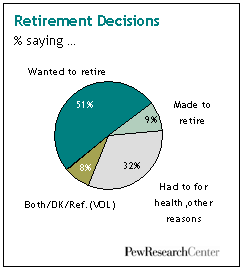
For many retirees, the decision to retire is not fully voluntary. Some older adults are forced out by mandatory retirement rules or a boss who wanted them out, while others leave reluctantly because of health or other reasons.
Overall, the survey finds that barely half (51%) of all current retirees say they wanted to retire. About a third say they left for health or other reasons, while 9% report they were forced out.
But involuntary retirement doesn’t necessarily mean the end of one’s working life. In fact, nearly one-in-six self-described retirees continue to do some form of part- or full-time work, and this is equally true of “reluctant retirees” (17% of whom continue to work) and those who chose to retire (18%).
What is different, however, is the way these retirees view their retirement years. Those who voluntarily retired are twice as likely as reluctant retirees to report that their retirement has turned out to be “very satisfying” (75% vs. 37%). At the same time, fully 30% of reluctant retirees say they were “not satisfied” or “not at all satisfied” with their retirement, compared with just 4% of those who wanted to retire.
Men, Women and Work
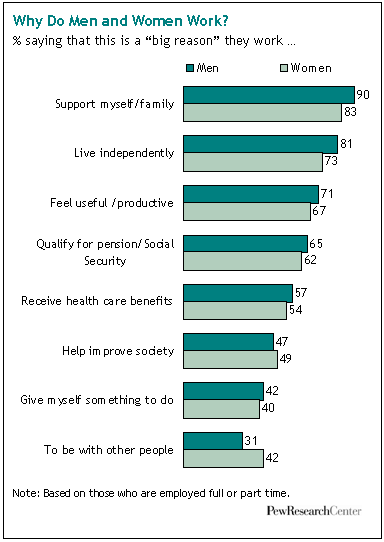
More than two-thirds of all men and about six-in-ten women do some kind of work for pay. The employment trends for men and women, once very different, are now nearly parallel. For men, the past 10 years have been a continuation of a long, slow decline in work force participation. For women, the past decade has been a leveling off after five decades of steady rise.
Underlying these trends are many shared attitudes toward work. Men and women generally say they work for the same reason: to provide for their families; to feel useful; to build a retirement nest egg; to qualify for health care; and to live independently.
At the same time, differences do emerge, and these disparities appear critical to understanding the overall employment trends of men and women. Many of these differences arise from gender relations in the home.
Women are still more likely to shoulder the larger share of responsibility for family care and maintaining the household. According to the survey, men and women overwhelmingly agree that it would be better if mothers of young children did not have full-time jobs but instead worked part time or did not work outside the home at all.
Together, these facts of contemporary domestic life play out in the work force in two important ways.
Women who do not work for pay are nine times as likely as men to cite child care or other family responsibilities as a big reason they don’t have a job (27% vs. 3%).
At the same time, women — particularly those with children 16 and younger-are far more likely than men to hold a part-time job. Working women-particularly mothers with children still at home — also are more likely than men to prefer part-time work over full-time employment. Nearly all men, meanwhile, want a full-time job. Women also are slightly more likely than men to say they work because they have to, not because they want to.
Despite these differences, virtually identical majorities of working men (89%) and women (90%) say they are satisfied with their job.
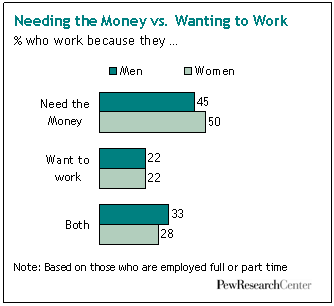
Why Men and Women Work
Overwhelming majorities of men and women agree: The single biggest reason they work is to support themselves and their families. Men, however, are somewhat more likely than women to cite this factor as a big reason (90% vs. 83%) they hold a job.
Men also are more likely than women to say they work to live independently, though again large majorities of both men (81%) and women (73%) cite this as a big reason they are employed. Married men are somewhat more likely than married women to say they work in order live independently (78% vs. 68%).
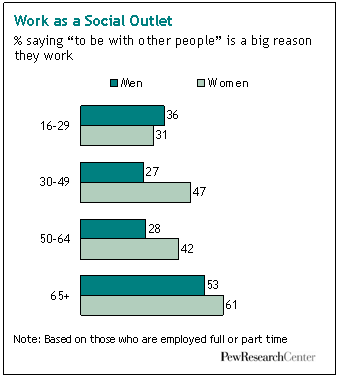
Women, meanwhile, are more likely to see work as a social outlet. Slightly more than four-in-ten women (42%) say a big reason they work is “to be with other people,” a view shared by 31% of men. In particular, middle-aged and slightly younger women are inclined to say the social aspect of life at work is important to them. Amhong women ages 30 to 49, nearly half say a big reason they work is to be with others.
On other benefits of working life, roughly equal proportions of men and women agree. Similar-sized majorities say work is important to them because it makes them feel like a useful person (71% of men, 67% of women). Men and women also are equally like to say an important reason they work is to save for retirement or qualify for a pension, receive health benefits, improve society or to “give myself something to do.”
Why Men and Women Don’t Work
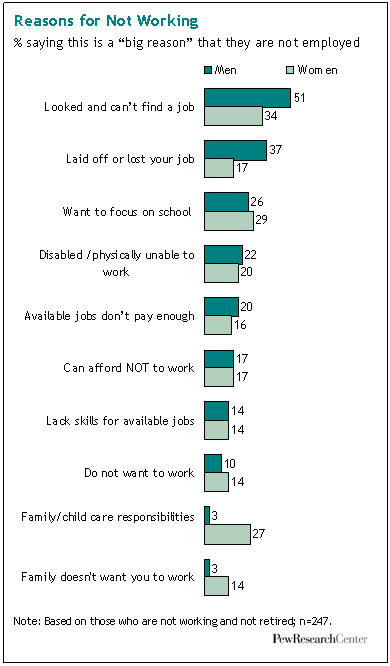
While the sexes share the same motivations for working, men and women who don’t have a job (either because they’re unemployed or out of the work force) offer very different reasons for not working.
Men are far more likely to blame labor market conditions: 51% of men versus just 34% of women say they aren’t working because they looked for a job but couldn’t find one. And by a ratio of more than two-to-one, more men (37%) than women (17%) report they aren’t working because they were recently laid off or lost their jobs — a finding consistent with government unemployment data suggesting that men are far more likely to have been laid off or fired during the current recession.
At the same time, women are significantly more likely to cite family reasons to explain why they are not working. Fully 27% of all women who are not currently employed say family or child care responsibilities are big reasons for that, versus just 3% of men. In addition, women are more than four times as likely as men to say they are not working because their spouse or family doesn’t want them to work.20
Attitudes toward Women’s Role Influence Job Preferences
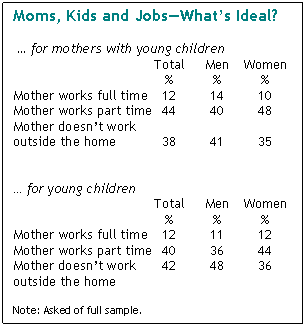
Despite dramatic changes over the years in attitudes about the role of women, large majorities of Americans still believe the ideal situation for a mother with one or more young children is not to hold a full-time job. And these preferences are mirrored in the workplace, where a majority of women with younger children who work full time say they would prefer to have a part-time job.
Men and women agree: Ideally, a mother’s place is not holding down a full-time job. Overall, only 12% of all adults believe working at a full-time job is the “ideal” situation for a woman with younger children, a view shared by 14% of men and 10% of women. More than four-in-ten (44%) say a part-time job is preferable, while a somewhat smaller percentage (38%) say the ideal situation is for the mother not to work outside the home at all.
Men and women differ over whether a part-time job or full-time motherhood is best for moms and their children. Nearly half of all women (48%) but a smaller proportion of men (40%) says working part time is ideal for the mother of small children. Men are more likely to say it is best if the mother does not work outside the home (41% vs. 35%).
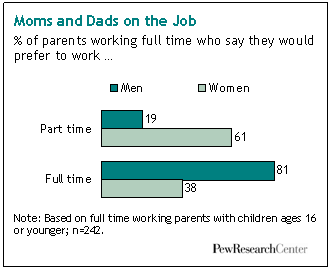
The gender differences on what is best for younger children are similar: women are more likely than men to say it is best if the mother works part time (44% vs. 36%); men are more likely to favor moms staying at home (48% vs. 36%). However, the sexes agree that full-time work isn’t ideal for young children or their mothers: only 11% of men and 12% of women consider this the best option.
These overall preferences are emphatically echoed in the results of a survey question that asked parents who work full time if they would prefer a part-time job.
Among mothers with children 16 and younger, the verdict is clear: Fully 61% say they would rather be working part-time. But when fathers of younger children are asked the same question, their answer is even more unequivocal: More than eight-in-ten prefer to keep their full-time job.




